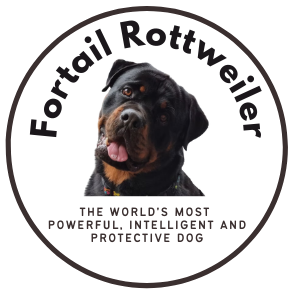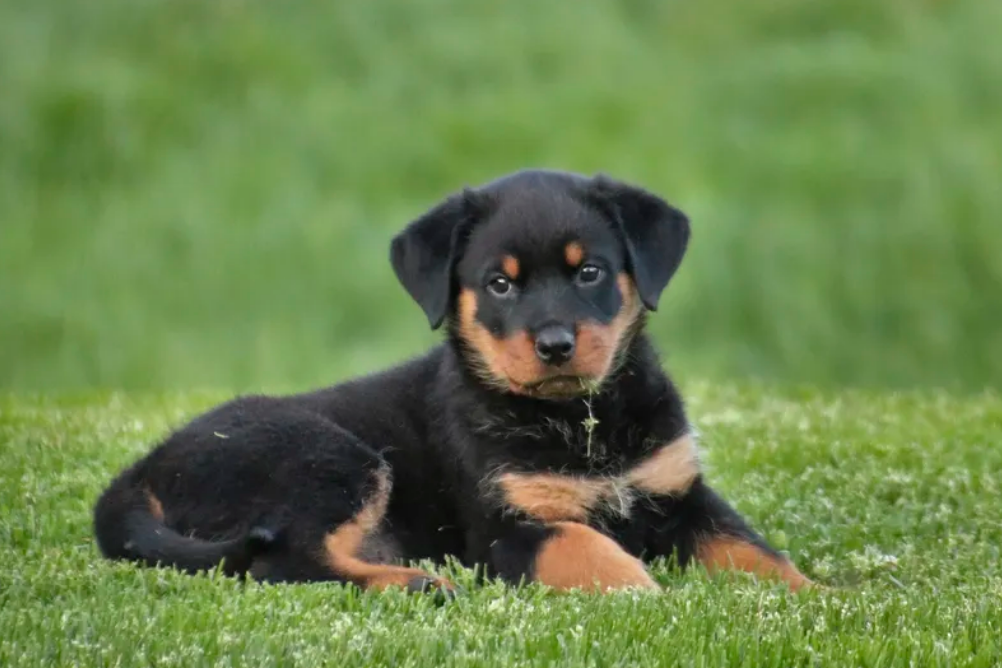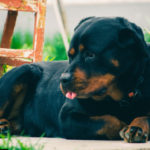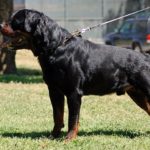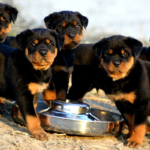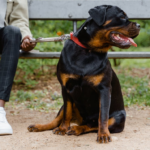Caring for a Rottweiler puppy requires a significant amount of patience and dedication. Proper nutrition is essential to ensuring that your Rottweiler puppy gets a high-quality, age-appropriate food that is created for big breeds, and it should be changed as the puppy grows. Socialization and training are needed for your Rottweiler puppy to grow well-adjusted and well-behaved, and frequent exercise is required to keep them healthy and happy. Regular veterinarian care and genetic testing are also essential for identifying possible health concerns and providing preventive treatment. Finally, giving a caring and loving environment and spending quality time with your Rottweiler puppy can help create a strong bond and assure their general health and well-being.
Check out this video:
Rottweiler Puppy Behavior Stages
As they grow and mature, Rottweiler puppies go through several behavioral stages.
- The neonatal period, which lasts from birth to two weeks, is the first stage. Rottweiler puppies are fully reliant on their mother at this point and are unable to see or hear.
- The second stage is the transitional period, which lasts between 2 and 4 weeks. Rottweiler pups begin to open their eyes and ears during this period, and they grow more mobile. They will also begin to interact with their mother and littermates more.
- The third stage is socialization, which lasts between 4 and 12 weeks of age. Rottweiler pups are very impressionable at this period, and it is essential for socialization and training. They will become more interested and energetic, interacting with their surroundings and learning from their mother, littermates, and human caretakers. This is the time at which they learn to trust and connect with people, and a lack of socialization at this age may contribute to behavioral issues later in life.
- The juvenile stage, which lasts from 12 weeks to 6 months, is the fourth stage. Rottweiler pups will begin to establish their own personalities and grow more independent at this time. They will also begin to push boundaries and question authority. This is a crucial stage in training since it is necessary to set clear norms and limits as well as continuous socializing.
- The adolescent period, which lasts from 6 months to 2 years, is the fifth stage. Rottweiler pups will go through a development spurt and become more physically and cognitively mature at this time. They will also begin to behave more like adults, necessitating more complex instruction and discipline.
How to Train Rottweiler Puppy at Home
Patience, consistency, and positive reinforcement are all required while training a Rottweiler puppy at home. The first step is to create a schedule that includes regular food times, toilet breaks, and training sessions. To promote excellent behavior, begin with simple instructions like sit, stay, come, and heel, and utilize positive reinforcement strategies such as rewards and praise. Because consistency is important, use the same instructions and training techniques every time. Socialization is also key, so introduce your Rottweiler puppy to a variety of people, animals, and environments to help them develop into well-adjusted and well-behaved adults. Consistent and positive training will assist in the growth of your Rottweiler puppy into a well-mannered companion.
Feeding and Nutrition for Rottweiler Puppies
Feeding and nutrition are essential for Rottweiler puppy growth and development. Rottweiler pups should be given high-quality, age-appropriate, large-breed-specific food. The diet should be high in protein and low in fat and carbs. It is essential to give your Rottweiler puppy a diet suited for its age, size, and activity level, and to alter the quantity of the food as the puppy develops. Feeding your Rottweiler puppy the proper food at the right time can help them develop into healthy, robust adult dogs. Giving them enough nourishment and energy will help their bone growth, muscular development, and general wellness. It is also critical to constantly check their weight and contact with a veterinarian if they have any special nutritional demands or requirements.
Key Takeaways
Caring for a rottweiler puppy is essential for their general health. This involves correct nutrition, socialization and training, frequent exercise, veterinary care on a regular basis, and a caring and supportive environment. Rottweiler pups may develop into healthy, well-adjusted adults if these requirements are met. Overall, as a responsible and loving owner, you must ensure that they enjoy a long and happy life.
